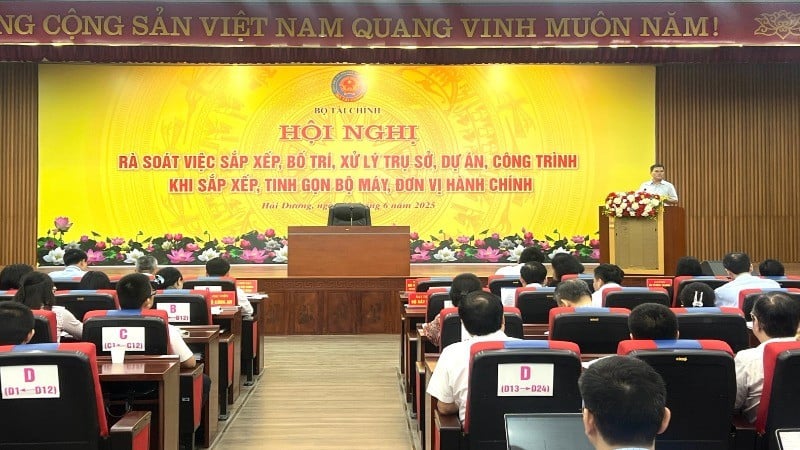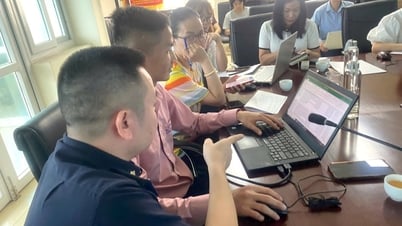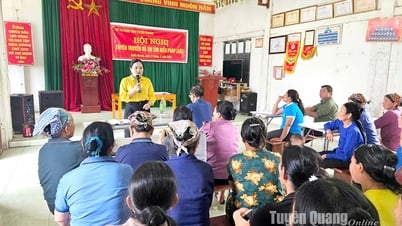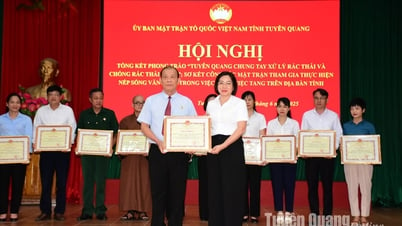Overview of the working session. (Photo: MINH PHUONG)
Participating localities include: Hai Phong City and the provinces of Bac Ninh, Bac Giang , Hung Yen, Thai Binh, Ha Nam, Nam Dinh, Ninh Binh, Quang Ninh, Lang Son, Cao Bang and Hai Duong.
Thousands of headquarters and real estates awaiting processing after restructuring
Speaking at the meeting, Deputy Minister Bui Van Khang emphasized: "The scale of asset arrangement and handling due to streamlining the organizational apparatus and administrative units is very large, requiring the determination of the entire political system to ensure savings and avoid loss and waste of public assets."
The Deputy Minister said that in the past time, the Ministry of Finance has presided over the drafting and submission to the Government for promulgation of many important legal documents such as Decree 114/2024/ND-CP, Decree 50/2025/ND-CP and official dispatches guiding the handling of public assets when restructuring the apparatus. However, through the synthesis of the results of the General Inventory of public assets at agencies, organizations, units and infrastructure assets invested and managed by the State according to Decision No. 213/QD-TTg of the Prime Minister and reports of ministries, branches and localities according to Official Dispatch No. 125/CD-TTg, there are still many assets that are not used or are not used for the right purposes.
Implementing the conclusions of the Standing Committee of the Central Steering Committee on anti-corruption and waste, and implementing the Prime Minister's Official Dispatch No. 80/CD-TTg, the Ministry of Finance issued Decision No. 1805/QD-BTC dated May 20, 2025, establishing a Working Group to coordinate the review and handling of public works and real estate when rearranging the administrative apparatus, in order to ensure effective use and avoid waste. The Working Group is also responsible for reviewing projects, works, and headquarters under construction or approved for investment but affected by the streamlining of the apparatus between the Central and local levels.
At the conference, Mr. Tran Van Quan, Vice Chairman of the People's Committee of Hai Duong province, said that the whole province has 4,284 houses and land that need to be reviewed. Of these, the province retains 3,981 facilities, transfers 80, recovers 20 and part of 4 other facilities. The implementation process has encountered some difficulties such as not completing the approval of the plan to handle public assets at the district and commune levels; there are legal problems in bidding for projects using land; difficulties in handling public assets that are no longer needed such as cultural houses, stadiums, etc.
Notably, the province also reflected that the determination of land use rights value still overlaps between the State's compensation price and market price, affecting the interests of investors and the efficiency of asset handling.
On the Hai Phong side, Deputy Director of the Department of Finance Tran Xuan Toan reported that about 1,579 out of 1,979 houses and land under review have been processed, reaching about 80%. However, the processing progress is still slow because some facilities are encroached upon, or are being leased or joint ventured illegally. Currently, the city has about 183 surplus houses and land at the commune level that need to be processed, and it is expected to complete the rearrangement of all facilities according to a specific roadmap and clear grouping.
The city also reported that some central agencies have not made specific proposals on the need to use headquarters, causing difficulties in rationally arranging assets; some units, although having needs, have not fully coordinated to complete the handling plan, leading to delays in implementation.
Also at the conference, Mr. Nguyen Le Huy, Vice Chairman of the People's Committee of Hung Yen province, reported on the current status and plan for handling public assets until May 30, 2025. According to the project on rearranging commune-level administrative units, before the rearrangement, the whole province had 1,889 headquarters (including 1,021 administrative headquarters, 58 commune police headquarters and 810 cultural houses, halls and sports grounds). After the rearrangement, 1,824 headquarters continued to be used, leaving 63 redundant headquarters (57 administrative headquarters and 6 cultural houses). The Provincial People's Committee directed the review and development of appropriate handling plans: continue to arrange for use, transfer to other units or auction according to regulations.
According to the Project on the arrangement of provincial administrative units, Hung Yen has a total of 2,078 headquarters (1,210 administrative headquarters, 58 commune police headquarters and 810 cultural houses). Based on the results of the review of public assets of Thai Binh province and the guidance of the Ministry of Finance, the Department of Finance of Hung Yen province is coordinating to develop a handling plan and submit it to the Provincial People's Committee for approval. This plan ensures compliance with reality, effective use of public assets, avoidance of waste and compliance with legal regulations.
Proposing, removing obstacles, promoting effective use of public assets
At the conference, representatives of 12 localities proposed that the Ministry of Finance soon have a plan to handle projects, works, and headquarters that are under construction or have been approved in principle but have to be temporarily suspended due to the impact of the administrative unit arrangement. Localities proposed that they could continue to implement or adjust the purpose of use accordingly, in order to avoid wasting resources. In addition, many localities also requested that the Ministry of Finance provide specific guidance on handling requests from central agencies to transfer headquarters and redundant public service facilities arising outside the content of the Commune-level Administrative Unit Arrangement Project, in the context that this project is still awaiting approval.
Concluding the conference, Deputy Minister Bui Van Khang highly appreciated the proactiveness and positivity of localities in developing plans to arrange and handle assets when streamlining the administrative apparatus under the direction of the Politburo, the Secretariat, the Government and the Prime Minister. Many localities have issued plans to handle surplus assets. However, some localities are still slow in implementing, and the number of surplus houses and land assets is still large.
The Deputy Minister said that the difficulties and recommendations of localities were answered and guided by representatives of specialized units of the Ministry of Finance and the Working Group at the conference. To ensure the handling of public assets and the implementation of administrative headquarters projects effectively and economically after the administrative unit arrangement, the Ministry of Finance requested localities to continue training, guiding, thoroughly grasping and directing the full and serious implementation of the directions of the Politburo, the Secretariat, the Prime Minister, along with legal documents and instructions of the Ministry of Finance in the arrangement and handling of public assets.
At the same time, localities need to direct competent authorities to review and synthesize all headquarters and public assets currently under management, as well as headquarters construction investment projects that have been approved for investment but have not yet been implemented. On that basis, develop a plan to arrange and handle assets and propose the implementation of projects and works affected by the administrative unit arrangement. It is necessary to thoroughly implement the asset handling plan at the same time as the administrative unit arrangement project, in the spirit of "running and queuing at the same time".
For surplus houses and land, it is necessary to develop a handling plan according to the "6 clear" principle as directed by the Prime Minister: clear people, clear work, clear time, clear responsibility, clear product, clear authority. At the same time, regularly update the list of newly arising surplus houses and land to add to the plan, to ensure that the handling of public assets is implemented synchronously, effectively, economically and in accordance with legal regulations.
The synchronous, drastic and proper implementation of public asset handling after administrative unit reorganization will be an important step to improve the efficiency of public asset use, reduce waste and loss, and contribute to stabilizing the organizational apparatus in the new period.
Source: https://baotuyenquang.com.vn/bo-tai-chinh-huong-dan-xu-ly-tai-san-cong-tai-cac-tinh-thanh-phia-bac-213047.html


























































































![[OCOP REVIEW] Tu Duyen Syrup - The essence of herbs from the mountains and forests of Nhu Thanh](https://vphoto.vietnam.vn/thumb/402x226/vietnam/resource/IMAGE/2025/6/5/58ca32fce4ec44039e444fbfae7e75ec)







Comment (0)